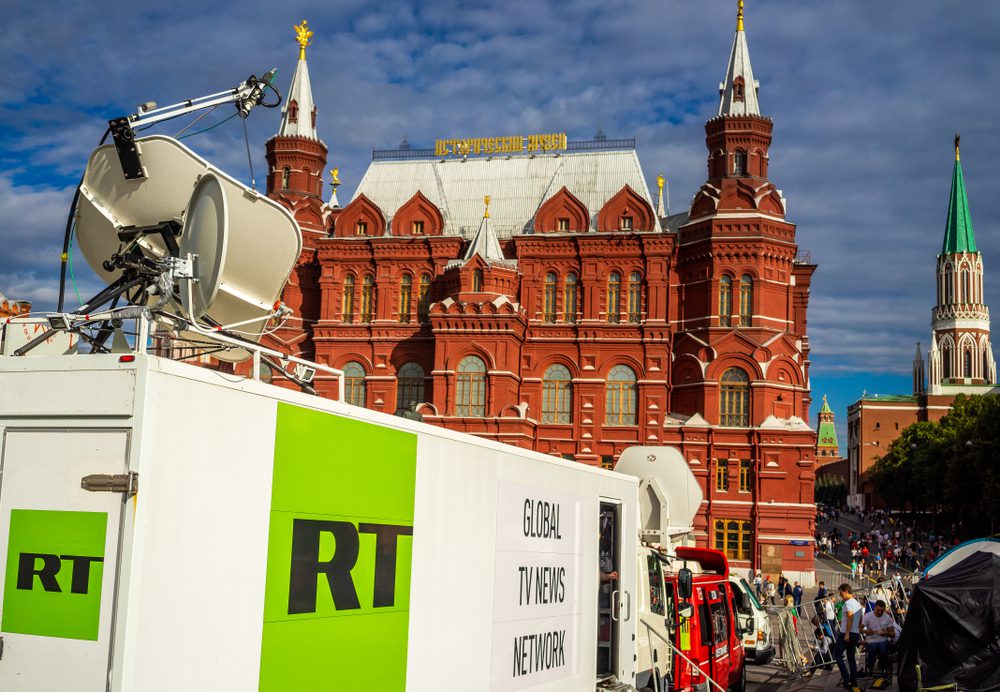
The conflict between Russia and Ukraine is unsurprisingly turning into an information war.
President of the European Commission Ursula von der Leyen called on Sunday, February 27th, for the Russian media Russia Today and Sputnik to be banned from the European Union, so that they stop spreading “lies” designed to “justify Putin’s war.” They are also accused of “sowing division” within the EU. However, regardless of the threat these media outlets pose, questions arise whether full EU control of information is the right response to Russian actions.
The Russia Today channel is broadcast in about 100 countries, in English, French, and Spanish. Its annual budget of €430 million is entirely financed by the Russian state. Several European countries have already taken measures against the channel, even before the conflict began. A few weeks ago, Germany banned RT on its territory; in retaliation, Moscow cancelled the German channel Deutsche Welle. Boris Johnson announced that the channel’s British license would be reviewed. In France, the Senate asked the regulatory authorities to suspend the channel.
Since the beginning of the conflict, the treatment of news on RT has differed significantly from other media. Their analysis tends to emphasise Putin’s desire to de-escalate tensions; it mentions plans for talks or insists on the uselessness of sanctions. Most of the time, RT ignores military clashes, and their victims. According to French political scientist Maxime Audinet, who has written on the Russia Today channel, the purpose of the pro-Russian media is to “destabilise” and not simply to give Russia good press abroad.
Regardless of RT’s disruptive messaging, some in the EU community are speaking out against the censorship. RT France director Xenia Fedorova reacted on Twitter by saying that the decision was “a violation of the rule of law that goes against the very principles of freedom of expression.”
La décision de bannir notre chaîne, dans laquelle travaille 176 salariés, dont plus de 100 journalistes, est une violation de l'Etat de droit et va à l’encontre des principes mêmes de la liberté d'expression. Rien ne peut justifier cette censure.
— Xenia Fedorova (@xfedorova) February 27, 2022
For the time being, no time frame for the ban has been given. Furthermore, there is nothing legally obvious about the ban; it is not a simple process. In France, for example, only the independent administrative authority of Arcom has the power to decide to ban the broadcasting of a channel, and only after an investigation finds serious breaches in ethical or legal matters. Afterwards, it can be appealed to the Council of State.
On the other side of the Atlantic, the U.S. plans to lend support to Europe’s ban. Google announced that it had suspended the possibility for RT and Sputnik to generate money via its platforms. On YouTube, channels earn money from the ads that appear when users watch their videos; YouTube has therefore decided to suspend this possibility for the Russian state media. Facebook, for its part, had already announced on Friday, February 25th, that it was banning RT from running ads and monetising their activity on its platform.
The Russian news agency Tass has also been suspended from the European Alliance of News Agencies, which believes that the Russian agency no longer respects its rules on providing free and impartial information. The decision came on Sunday, February 27th, after the Russian media regulator Roskomnadzor issued a statement ordering national media to remove from their content any reference to civilians killed by the Russian army in Ukraine as well as the terms “invasion,” “offensive,” or “declaration of war.” “We stress that only official Russian sources have current and reliable information,” Roskomnadzor said. Officially, the terms used by Moscow to describe its intervention in Ukraine are “special military operation” for “peacekeeping.” The statement took the form of a formal warning to media outlets deemed too critical of the government, such as Novaya Gazeta, whose editor-in-chief Dmitri Muratov was awarded the Nobel Peace Prize in 2021.
RT journalists are progressively losing their accreditations. As the ban is already effective on YouTube, Facebook, Instagram, TikTok, and even Telegram, RT has announced its intention to take legal action against further restrictions.
